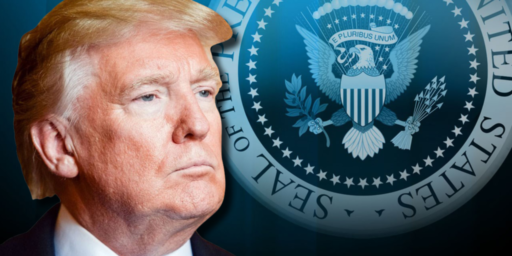The Blink Presidency
Joe Klein applies pop psychology to President Bush in TIME:
It should come as no great revelation that George W. Bush is a wantonly decisive President. He decides Ariel Sharon is good and Yasser Arafat is evil, even though seasoned diplomats tell him it is not wise to make such sweeping judgments. He decides that Social Security needs to be transformed and that private investment accounts are the way to do it, even though the experts say there is no great crisis and his way won’t solve anything. He decides to invade Iraq, with minimal contingency planning. He decides to cut taxes drastically and then to spend an outlandish sum on a Medicare prescription-drug benefit. His presidency has been exhilarating and nerve-racking, imprudent and visionary—and now we learn that it is another thing as well: it is a prime example of the latest fad.
Bush is the ultimate “Blink” President, to use author Malcolm Gladwell’s catchy term, and recent title, for instantaneous, subconscious decision making. The slogan on Gladwell’s book jacket—”Don’t Think—Blink!”—is a perfect mantra for an attention- deficit-disordered society, and an apt description of the electric jolt Bush has brought to politics and policy. It certainly was the subtext of the 2004 presidential campaign: Kerry’s thinking seemed tortured, paralytic; Bush’s blinking seemed strong and decisive.
But there are problems. “We don’t know where our first impressions come from or precisely what they mean, so we don’t always understand their fragility,” writes Gladwell, who is way too smart to be a cheerleader for the immediate. Gladwell argues that blinking is best when it is reinforced by a lifetime of study and expertise. Bush’s blinks come in two basic varieties: judgments about people and about broad policy. Bush may be a master at judging people—though one wonders what he saw in Vladimir Putin’s soul—but he hasn’t spent much time learning the intricacies of getting a bill through Congress or thinking about how the pieces of the puzzle might fit together in the Middle East after the invasion of Iraq. There is rarely any thought of how a blink will be carried out, or the contradictory impact that his blinks might have on one another. David Kuo, a former deputy director of the President’s Office of Faith- Based and Community Initiatives, argued last week on the Beliefnet website that the President had blinked at the well-publicized faith-based antipoverty initiative and then forgotten it. Kuo, who is a friend of mine and truly believes in the President’s commitment to the policy, remains mystified by the disconnect between passion and action. Blinks are ephemeral; policy is distressingly concrete.
And yet, for the moment, Bush’s instincts—his supporters would argue these are bedrock values—seem to be paying off. The President’s attention span may be haphazard, but the immediate satisfactions are difficult to dispute. Saddam Hussein? Evildoer. Take him out. But wait, no WMD? No post-invasion planning? Deaths and chaos? Awful, but … Freedom! Look at those Shi’ites vote! And now, after all that rapid-eye movement, who can say the Shi’ites and the Kurds won’t create a government with a loyal Shi’ite-Kurd security force? And who can say the Sunni rebels won’t—with some creative dealmaking—eventually acquiesce? The foreign-policy priesthood may be appalled by all the unexpected consequences, but there has been stunned silence in the non-neocon think tanks since the Iraqi elections.
The problem with all this analysis is that it seems to be based on something even less than a Blink. Upon what does Klein base his assessments of Bush’s decision-making process? He doesn’t tell us in the piece.
I don’t doubt that Bush, like most of us, makes snap judgments about people he encounters. Like most of us, his first impressions are sometimes wrong and yet he is slow to change. Cognitive dissonance and all that.
It seems highly unlikely, however, that first impressions are the basis for much policy making by the Administration. Bush’s critics can’t have it both ways. Either Bush is a mere instrument for the evil genius of Karl Rove or a puppet for Dick Cheney or he is himself in charge. Every indication I’ve seen points to the latter. But, like most successful managers, Bush is a delegator. Those in charge of various functional areas do the hard work, they present it to the President in very short versions with the options boiled down to a few, and he takes it from there.
Further, the “blink” approach seems like a bizarre template to describe a firm foreign policy vision. “Freedom is the key to beating Islamist terrorism” is not a blink but rather the boiling down of a very complex set of ideas.





You are correct. Also, Joe Klein is a purveyor of “Blink” journalism from way back. Lots of words, not a lot of sound logic. He only appears smart because he misuses smart quotes. Judging from his awkward “wantonly decisive” comment, he apparently feels that a President that makes decisions and sees them through is somehow flawed. How revealing such a comment is about the author’s personal prejudices.
Wantonly decisive, how gauche.
Seems rather clear that this is an attempt to discredit the President on no evidence whatever.
If I had to choose between a chief executive that makes blink judgements and one who has an accute case of analysis paralysis, I’d pick the blinker.
This past November, the rest of America concurred.
Wow Dave, the rest of America concurred?
So the 48% of Americans that voted for Kerry are really not part of America?
All I can really conclude from what Joe Klein wrote is that he was desperate to make a deadline for this weeks edition of Time.
He decides Ariel Sharon is good and Yasser Arafat is evil, even though seasoned diplomats tell him it is not wise to make such sweeping judgments.
What?, is he kidding us? ‘Seasoned Diplomats’ or ‘Pickled Diplomats’? who is this guy talking to?